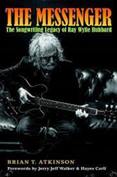

“You know, I’ve never thought about my songwriting legacy,” Cosmic Country singer-songwriter Ray Wylie Hubbard admits. “I guess I’ve written some pretty cool songs that nobody else seems to be writing. As guess as far as legacy, I hope it’s that I wrote some cool, badass songs. Some sold and some didn’t. Most didn’t.” The Messenger: The Songwriting Legacy of Ray Wylie Hubbard book and album have been released this summer.

The Messenger: A Tribute to Ray Wylie Hubbard James McMurtry • The Messenger The Band of Heathens • Drunken Poets Dream Ray Benson • Easy Money Down in Texas Charlie Musselwhite • Resurrection Bobby Bare • Snake Farm Radney Foster • Screw You, We're from Texas Tom Russell • Dust of the Chase Tim Easton • Conversation with the Devil Scott Biram • Chickens Slaid Cleaves • The Sun Also Rises Walt Wilkins • Wishbones Shinyribs • Whoop and Hollar Rod Picott • Portales Jon Dee Graham • Mother Blues Terri Hendrix • Without Love Chris Fullerton (feat. Slaid Cleaves) • Stone Blind Horses Jonathan Tyler • Wanna Rock and Roll Rodney Crowell • In Times of Cold
Ray Wylie Hubbard (born November 13, 1946) is an American singer and songwriter.
Hubbard was born in the town of Soper, Oklahoma. His family moved to Oak Cliff in southwest Dallas, Texas, in 1954. He attended W. H. Adamson High School with Michael Martin Murphey. Hubbard graduated in 1965 and enrolled in the University of North Texas as an English major. He spent the summers in Red River, New Mexico, playing folk music in a trio known as Three Faces West.
During his time in New Mexico, Hubbard wrote "Up Against the Wall, Redneck Mother" first made famous by Jerry Jeff Walker's 1973 recording, and covered by a wide variety of other artists since. Bolstered by the success of the song, he was signed by Warner Bros. Records. Hubbard then put together a band of friends and locals and in 1976 released Ray Wylie Hubbard and the Cowboy Twinkies. Unbeknownst to Hubbard, producer Michael Brovsky had decided to "Nashville-ize" the sound by adding overdub mixes and female backup singers to the recordings. The result was "a botched sound" that Hubbard disapproved of vehemently, but the album was released despite his attempts to block it.
Hubbard then recorded albums for various other labels for the next 10 years but struggled with sales; his mix of country, folk and blues elements did not find an audience. Although he recorded several albums, by 1985 he left the music scene after struggling with personal problems. The last album he recorded in the 80s was Caught in the Act (1984) on his newly formed Misery Loves Company record label.
He returned to recording in the early 1990s, and released his album Lost Train of Thought in 1992, followed by Loco Gringo's Lament in 1994. Eventually a steady following began to re-discover Hubbard's music and he has been recording steadily since. His guitar technique uses a strumming by the left (fretting) hand that is very old, but not frequently seen a double time without changing right hand beat.
He describes his 2017 album Tell the Devil I’m Getting There as Fast as I Can as rock & roll, though his style has become associated with outlaw country, which he makes fun of in the song Lucifer and the Fallen Angels singing "Why go to Nashville knowing you never, ever gonna be mainstream? It’s better to reign in hell than serve in heaven."

Text is available under the Creative Commons Attribution-ShareAlike License.
Date: September 2019.
Photo Credits:
(1)-(2) Ray Wylie Hubbard,
(3) Tim Easton,
(4) Radney Foster,
(5) Terri Hendrix,
(6) Rodney Crowell,
(7) Rod Picott,
(8) Slaid Cleaves,
(9) Tom Russell
(unknown/website).